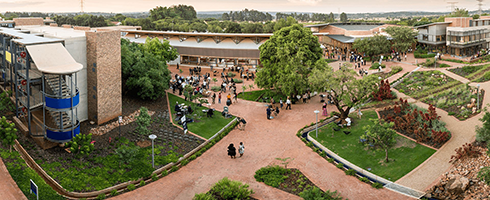Transdisciplinarity for transformation
Background
The Transdisciplinary (TD) approach to research has been adopted as a cornerstone of the University of Pretoria’s (UP) current strategy. It is argued that championing and supporting TD are explicit and bold steps towards accelerating and amplifying the impact of UP research and scholarship. TD approach will position UP at the forefront of contemporary efforts to ensure that universities contribute actionable knowledge that can inform and support societies in addressing a multitude of complex local and global challenges.
UP Institutional innovation
The Future Africa campus’s architecture was designed to provide accommodation to facilitate visiting scholars and to host regular international conferences, workshops, and colloquiums. Through regular dialogue, this ensures that the voice of Africa is amplified on the international stage. At the same time, the surrounding garden, set within an indigenous habitat, serves as showcase for the ecological beauty that South Africa is known for. Geographically the campus is surrounded by the UP Experimental Agricultural Farm, and creative collaborative research ties are maintained with the other TD Platforms of Engineering 4.0, the UP-Javett Art Centre and Innovation Africa@UP.
UP has created the opportunity for FA to operate as a neutral convenor, a safe space, and its performance as a platform is not tied to assessment in the usual academic sense. Though maintaining close ties with all Faculties, FA does not compete with faculties. Instead, it serves as inspiration and facilitator in support of their engagement in Transdisciplinary (TD) initiatives. This academic freedom, outside a traditional academically regulated environment, forms the core of the FA TD approach to research and serves as a democratic provider for Open Science contributions.
Future Africa’s Role in Advancing Transdisciplinary Research
Future Africa aims to establish a dynamic resource hub for transdisciplinary (TD) thinkers through critical dialogues. The TD Dialogue series will focus on three key areas: conceptual background, transformation issues, and innovative thinking beyond TD. We will forge collaborative links within the University of Pretoria and with external networks and think tanks to explore equitable TD approaches.
Our role includes advocating for TD, facilitating discussions on critical issues such as funding, policy interfaces, and the context and rationale for TD approaches. Additionally, we are committed to building a comprehensive archive of TD references on the Future Africa website to support ongoing research and practice.
“The transdisciplinary ethic rejects any attitude which refuses dialogue and discussion, no matter whether the origin of this attitude is ideological, scientistic, religious, economic, political or philosophical. Shared knowledge should lead to a shared understanding based on an absolute respect for the collective and individual diversities united by our common life on one and the same Earth”
(Transdisciplinarity Charter adopted at the First World Congress of Transdisciplinarity, Convento da Arrábida, Portugal, November 1994).
What is TD?
Transdisciplinarity is an attempt at formulating an integrative process of knowledge production and distribution. It is a reaction against the twentieth-century occurrence of narrow discipline focus and hyper-specialisation. It directly responds to complex and multi-layered challenges, it diffuses disciplines: it interlinks socio-economic problems, study the impact of globalisation, study the de-territorialised nation-states, and recognizes technological advancements, environmental concerns, food security, migration patterns, agricultural degradation, and levels of species extinction. Transdisciplinarity recognises the complex character of realities which calls for more than one discipline in terms of interpretation and application. Above all, this approach also acknowledges the need for joint-problem solving mechanisms. It seeks to stimulate unification of knowledge and of knowledge paradigms. Moreover, it is a movement in a direction towards case studies and problem-solving solutions.
Our Programmes
TD Dialogues
Future Africa is dedicated to advancing the role of transdisciplinary (TD) research by championing TD advocacy and facilitating in-depth discussions on pivotal issues. Our dialogue series will address crucial topics such as funding mechanisms, policy interfaces, the contexts in which TD approaches are implemented, and a comprehensive examination of the current state of TD thinking and practice. These dialogues aim to foster deep reflection and critical debate, driving the evolution and impact of TD methodologies across various fields.
Interactive TD Workshops
The series of interactive workshops is designed for postgraduate students, researchers, and academic leaders. These workshops will feature international facilitators and will offer participants valuable insights into key concepts, competencies, and phases of transdisciplinary work.
TD Resources
Future Africa is dedicated to advancing transdisciplinary research to tackle complex global challenges. This reading list offers essential texts on transdisciplinary principles, methodologies, and case studies. It is curated to enhance understanding and application across diverse fields.



